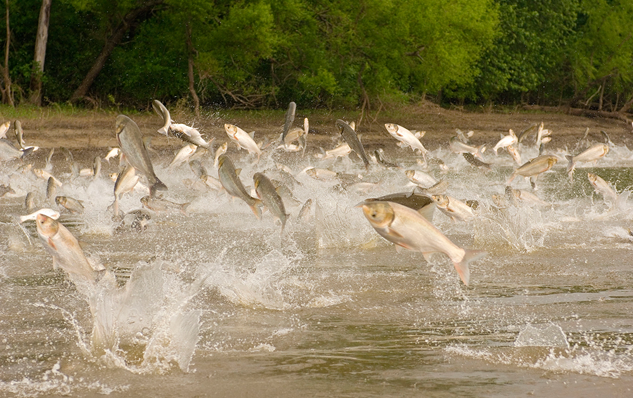THE FLYING FISH
The year is 1878, and the Civil War has been over for more than a decade. I am walking along the banks of the Missouri river, deep in thought and looking down at the rocks along the water’s edge. Out of the corner of my eye, I see what appears to be a fish flying in mid-air. I shake my head in awe, blink and then look again. This time I see multiple fish flying. They hit the water for just a second and then fly some more, fast and straight like skipping stones. I want to look at each one closely, but there are too many in the air at the same time so I concentrate on only the three largest ones who fly the highest and create the biggest splash.
I am soon aware of a man further down the river who is fly fishing but using a net instead. I watch as he swipes at the fish in the air, and I see him finally catch a small one. He drops it in a large container next to him, writes something down on a notepad and then returns to his fishing. In no time at all, he has caught another one, and this one is also added to the container and marked down in his book. He resumes his fishing again, never taking his eyes off the fish and never noticing me watching with fascination.
When his container is full of many small fish, the fisherman lifts it up and begins to carry it down a dirt path toward town. Since the sun is beating down on me and there is no shade to be found, I decide to head that direction myself. Although my first thought is to run up ahead and see if I can help the man, something tells me that he would not welcome a stranger. So I keep my distance and walk slowly behind him. As we approach Main Street, I see him stop Mrs. Appleby and ask her a question. She looks down at his container and seems confused about something. But then she points to the next block, and as he walks away, she watches him closely for a few seconds. She and I then exchange greetings, but I don’t linger to chat as I normally would. For some reason, I don’t want to lose the fisherman from my sight, so I keep following him. Shortly, he veers off to the left and into the county jailhouse. As I open the door he entered, I can hear the stranger inside saying to Sheriff Johnston: “Do what you want with them. They are the least of our concern. They are also guilty … but of minor offenses only. They were bamboozled just like the rest of us.”
I am still standing there by the door, when the fisherman comes out. As he passes me, he gives me a knowing nod and says “I was happy to oblige”. My eyes watch him until he disappears around the corner, and then I enter the jail myself and ask Sheriff Johnston if I can see the fish the stranger brought in. Although Johnston’s curiosity is aroused by my request, he says nothing and just hands me a set of keys. I walk behind him and then open the door which leads to the prison cells. As I proceed down the corridor, I glance into each one until I finally come across a cell with a fish in it. Then I find the appropriate key and let myself in. When I look closely, I recognize him right away as the first fish the stranger caught. He is lying on his side on the bottom bunk, and he is chewing on a piece of grass. When he looks up and notices me enter, he says: “Oh, it’s you. I knew you were watching me. You couldn’t take your eyes off me. What do you want?” I respond by asking if I can sit next to him, that I would like to talk to him for just a few minutes if he wouldn’t mind. He sits up and then moves over so I can join him. Then I begin to tell him everything that I have observed. I tell him that I saw many caught at the same time he was but noticed they were all small fish and that the fisherman said they were ALL guilty but of minor crimes only. I then turn to the fish and ask if he agrees with the stranger’s assessment. He looks puzzled at first and then looks down at the ground for a moment until he finally responds: “I am actually worse than anyone thinks, but I have also been betrayed and sabotaged just like the rest of the gang. I think I just need some time to get back on my feet. It might actually be good for me to stay here for a while … but you don’t need to worry about me. I will come out ok in the end.” So then I stand up and shake hands with him, pat him on the shoulder and say: “You seem ok to me now, but stay as long as you want. Everyone here should stay as long as they think necessary until they are ready to start again.”
As I head out of the fish’s jail cell, I look down the long hallway to my left and entertain the thought of visiting ALL the fish that had just been captured. But then I shake my head, go back to the front desk and return the keys to the Sheriff. I tell him that I have changed my mind and that these guilty fish don’t need me as much as I thought they did.
When I emerge from the jail, I am immediately blinded by the bright sun outside. I cover my eyes partially and look around. If I go to the left, I will be walking directly into the sun the whole way home. It’s a much quicker route, but I will most likely be uncomfortable the whole time with such a bright light in front of me. But if I go to the right instead, I will be taking a path which will be shady and cool. It will take much longer, though, and have many more challenges and choices along the way, some leading to dead ends, dark alleys and potholes that can’t be seen until it’s too late.
I stand in the middle of the road and look again at my two choices. Then I glance at my watch and realize it’s later than I thought. So the clock has made the decision for me. I open my purse, pull out my sunglasses and then head to the LEFT.
Copyright © 2014 (Michelle Parsons, Getting Back on Your Path). All Rights Reserved.

